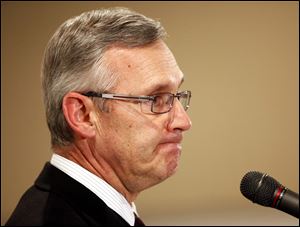
Integrity of OSU tarnished after decision
3/10/2011
Ohio State coach Jim Tressel listens to a question from members of the media during an NCAA college football news conference, Tuesday.
So we won't waste any time either.
Where Jim Tressel should have ended up at the end of the day was the unemployment line.
Tressel had knowledge that some players were violating NCAA rules and nonetheless played them throughout an 11-win regular season, another Big Ten championship season that included another win over Michigan. When the actions of five starters became public he helped orchestrate an accommodation with the NCAA that somehow made those players eligible for the Sugar Bowl, which resulted in another win.
As that process was evolving, as OSU stated for the record it knew nothing about so-called "TattooGate" until early December, after the completion of the regular season, Tressel stood mute on the fact he had known something was going on since April. He deceived his employers, OSU's compliance officials, the governing body of college athletics, and allowed the school to be guilty of serious NCAA infractions. He violated a crucial clause in his contract and failed to foster the NCAA's rather sacred atmosphere of compliance. It was an offense that easily could have led to his termination.
Instead, when OSU president E. Gordon Gee was asked if he had considered firing Tressel, he said, "Are you kidding?" and followed with some lame throwaway line about hoping the coach wouldn't fire him.
That, friends, brings us perilously close to the tail-wagging-the-dog symmetry that exists between football and Ohio State.
Smith made a big deal about inviting NCAA investigators in-house from the start of OSU's investigation into Tressel's conduct, as if the Buckeyes should get extra credit on their report card.
What Ohio State determined in self-reporting the violation was that Tressel should be suspended for two games -- the players involved received five-game suspensions to start next season, currently under appeal -- and absorb a fine of $250,000, an impressive-sounding figure, but just one-fourteenth of the coach's annual salary of $3.5 million.
The NCAA, regardless of how many times Smith curtsied in its direction, could, and certainly should, add some teeth to that bite. If Tressel knowingly employed ineligible players does that not call into question those 12 wins, that Big Ten title, and all that Sugar Bowl revenue? The NCAA must act because it is obvious Ohio State isn't capable of, or interested in, taking on its football coach.
Look, I don't think Jim Tressel is a bad guy. I've heard too many stories to the contrary. Nor do I think he is the deity his record and championships make him out to be to so many OSU fans. He has tap-danced with the NCAA before -- out of omission, perhaps, more than this obvious commission -- and he has been accused of selective discipline. This time, the slop sticks to his Teflon-coated sweater vest.
Gee painted Tressel as a virtuous leader of young men, as a man who was grief-stricken over the way this had played out.
What I saw was a man who, despite discomfort, was still rather disingenuous while offering excuses -- he apparently had greater concerns over the confidentiality of a drug investigation aimed at a tattoo-parlor owner than in the potential damage to his players, program and school -- more than apologies. Tressel said he never considered resigning.
"The integrity of this program, and this coach, is absolutely superb," Gee said.
Not anymore, E. Gordon. Not anymore.
Contact Blade sports columnist Dave Hackenberg at: dhack@theblade.com or 419-724-6398.